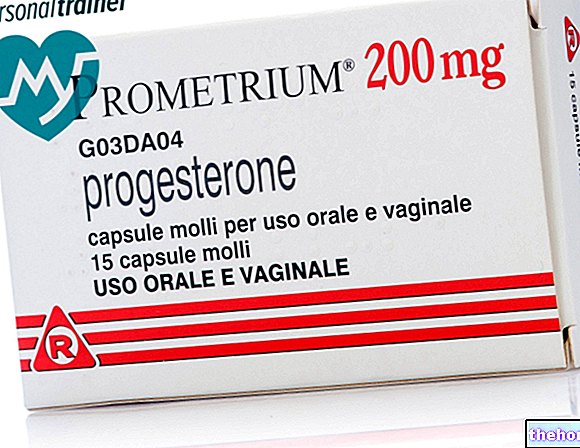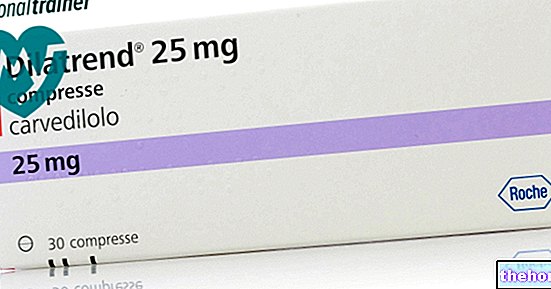Active ingredients: Indobufene
IBUSTRIN 200 mg tablets
Indications Why is Ibustrin used? What is it for?
Ibustrin contains the active ingredient indobufen. Indobufen belongs to a group of medicines called "antiplatelet agents" and works against the "aggregation of platelets (blood cells) by preventing the formation of blood clots. This prevents blockages of blood vessels and facilitates blood flow.
Ibustrin is used to prevent:
- occlusions of blood vessels after certain types of heart surgery (coronary artery bypass grafting).
Ibustrin is used to treat:
- intermittent claudication, a disease characterized by difficulty walking caused by reduced blood flow through the blood vessels of the legs.
Contraindications When Ibustrin should not be used
Do not take Ibustrin:
- if you are allergic to indobufen or any of the other ingredients of this medicine
- if you have suffered from asthma, rhinitis or hives following treatment with acetylsalicylic acid or other similar medicines called non-steroidal anti-inflammatory drugs (medicines used for inflammation, pain and fever);
- if you suffer from stomach ulcer (gastric ulcer) or bowel ulcer (duodenal ulcer);
- if you suffer from stomach bleeding (haemorrhagic gastritis);
- if you have severe liver problems (severe liver failure) or kidney problems (severe kidney failure);
- if you suffer from diseases that cause easy and severe bleeding.
Precautions for use What you need to know before taking Ibustrin
Talk to your doctor or pharmacist before taking Ibustrin:
- if you have suffered in the past from stomach or bowel injuries (eg bleeding, ulcers, inflammation).Take Ibustrin with caution as your stomach and bowel problems may come back;
- if you take other medicines that prevent platelet clumping (antiplatelet agents) or other medicines called non-steroidal anti-inflammatory drugs (against inflammation, pain and fever). Take Ibustrin with caution in combination with these medicines as stomach and bowel problems may occur;
- if you have kidney problems (kidney failure). Your doctor will prescribe a reduced dose of Ibustrin based on the severity of your kidney problems;
- if you are over 65, as your doctor will recommend a reduced dose of this medicine.
Tell your doctor if any of the following conditions develop or worsen during treatment with Ibustrin (see also section "Possible side effects"):
- stomach ailments such as heartburn, persistent discomfort, fullness, pain or others. If you experience these symptoms you should reduce the dose or temporarily stop treatment with Ibustrin;
- allergies (eg hives). If you experience allergic reactions you should stop taking Ibustrin.
Interactions Which drugs or foods can modify the effect of Ibustrin
Tell your doctor or pharmacist if you are taking, have recently taken or might take any other medicines.
Tell your doctor if you are taking any of the following medicines:
- sulfonylureas (medicines used to treat diabetes). In case of co-administration with Ibustrin, your doctor will have to check your blood glucose levels frequently;
- oral anticoagulants and heparin (medicines that slow down or stop the process of blood clot formation), because Ibustrin increases the effectiveness of these medicines, but the effectiveness of Ibustrin is also increased by these medicines;
Warnings It is important to know that:
Pregnancy and breastfeeding
If you are pregnant or breast-feeding, think you may be pregnant or are planning to have a baby, ask your doctor or pharmacist for advice before taking this medicine.
Currently, there are no known adverse effects from the use of this medicine during pregnancy. However, the use of Ibustrin during pregnancy or breastfeeding is not recommended.
Driving and using machines
Ibustrin does not affect the ability to drive or use machines.
Ibustrin contains lactose
Ibustrin contains lactose, a type of sugar. If you have been told by your doctor that you have an intolerance to some sugars, contact your doctor before taking this medicinal product.
Dosage and method of use How to use Ibustrin: Dosage
Always take this medicine exactly as your doctor or pharmacist has told you. If you are unsure, consult your doctor or pharmacist.
The recommended dose is 2 tablets per day. Take 1 tablet in the morning (after breakfast) and 1 tablet in the evening (after dinner).
If you are elderly and / or have kidney problems
If you are over 65 and / or have kidney problems your doctor will recommend a reduced dose of this medicine.
Overdose What to do if you have taken an overdose of Ibustrin
If you think you have taken more Ibustrin than you need, tell your doctor or pharmacist immediately. If detoxification is required, your doctor will take the necessary steps to eliminate the excess medicine by increasing your urine output. If you have stomach or bowel problems, your doctor will recommend medicines to counteract the symptoms.
If you have any further questions on the use of this medicine, ask your doctor or pharmacist.
Side Effects What are the side effects of Ibustrin
Like all medicines, this medicine can cause side effects, although not everybody gets them.
STOP using Ibustrin and see your doctor immediately if you experience any of the following side effects as some can be serious:
- brain haemorrhage (cerebral haemorrhage)
- stomach bleeding (hemorrhagic gastritis)
- vomiting of blood (hematemesis)
- passing of dark blood digested in stool (melena)
- bright red blood loss from the rectum (rectal haemorrhage)
- feeling of discomfort and fullness in the stomach (dyspepsia)
- formation of red spots or patches on the skin accompanied by a simultaneous reduction in the number of platelets in the blood (thrombocytopenic purpura)
- headache
- bright red patch that appears on the white part of the eye (conjunctival hemorrhage)
- bleeding through a cough (hemoptysis)
- nosebleed (epistaxis)
- stomach inflammation (erosive gastritis)
- stomach ulcer (gastric ulcer)
- pain in the abdomen (abdominal pain)
- stomach pain (epigastric pain)
- constipation
- diarrhea
- swelling of the abdomen
- nausea
- He retched
- bleeding of the gums and lips
- allergic-type skin inflammation (allergic dermatitis), itching
- loss of bright red blood in the urine (bladder bleeding)
- increased nitrogen levels in the blood
- increase in blood creatinine, a substance produced by the muscles (elevated blood creatinine) increase in the levels of substances normally produced by the liver (transaminases) in the blood
Reporting of side effects
If you get any side effects, talk to your doctor or pharmacist. This includes any possible side effects not listed in this leaflet. You can also report side effects directly via the national reporting system at https://www.aifa.gov.it/content/segnalazioni-reazioni-avverse By reporting side effects you can help provide more information on the safety of this medicinal.
Expiry and Retention
Keep this medicine out of the sight and reach of children.
Do not use this medicine after the expiry date which is stated on the carton and blister after "EXP". The expiry date refers to the last day of that month.
This medicine does not require any special storage conditions.
Do not throw any medicines via wastewater or household waste. Ask your pharmacist how to throw away medicines you no longer use. This will help protect the environment.
What Ibustrin contains
The active ingredient is indobufen.
Each 200 mg Ibustrin tablet contains 200 mg of indobufen.
The other ingredients are: lactose monohydrate (see paragraph 2 "Ibustrin contains lactose"), microcrystalline cellulose, sodium carboxymethyl starch, magnesium laurilsulfate, magnesium stearate.
What Ibustrin looks like and contents of the pack
Ibustrin 200 mg tablets are convex, circular, white tablets with a score line on one side and debossed with "I" on the other side. The tablets are available in PVC / Aluminum blister packs of 30. and 48 tablets.
Not all pack sizes may be marketed.
Source Package Leaflet: AIFA (Italian Medicines Agency). Content published in January 2016. The information present may not be up-to-date.
To have access to the most up-to-date version, it is advisable to access the AIFA (Italian Medicines Agency) website. Disclaimer and useful information.
01.0 NAME OF THE MEDICINAL PRODUCT
IBUSTRIN 200 MG TABLETS
02.0 QUALITATIVE AND QUANTITATIVE COMPOSITION
Each tablet contains:
active ingredient: indobufene 200 mg.
Excipient with known effect: lactose.
For the full list of excipients, see section 6.1.
03.0 PHARMACEUTICAL FORM
Tablets.
Ibustrin 200 mg tablets are white, circular, convex tablets with a score line on one side and debossed with "I" on the other side.
04.0 CLINICAL INFORMATION
04.1 Therapeutic indications
Indobufen is indicated:
- in the prevention of occlusion of coronary artery bypass grafts
- in the treatment of intermittent claudication due to peripheral arterial occlusive disease.
04.2 Posology and method of administration
The daily dosage is generally 400 mg, taken divided into two administrations at 12 hour intervals. It is recommended to take one tablet (200 mg) in the morning and in the evening after breakfast or after dinner respectively.
Since indobufen is eliminated essentially via the kidneys, the dosage needs to be reduced depending on the degree of renal function. In particular, in elderly patients (over 65 years), the physician must carefully decide the dosage taking into account that renal function progressively decreases with age.
The following scheme is suggested:
Creatinine clearance (ml / min):
> 80: 200 mg twice a day;
30-80: 100 mg twice a day;
04.3 Contraindications
Indobufen should not be administered to subjects who have shown hypersensitivity to the active substance or to any of the excipients listed in section 6.1; it must not be used in the presence of duodenal gastric ulcer, haemorrhagic gastritis, severe hepatic and / or renal insufficiency or in subjects with hemorrhagic diathesis.
There is a possibility of cross-sensitivity with acetyl salicylic acid or other non-steroidal anti-inflammatory drugs; for this reason, indobufen should not be administered to patients in whom these drugs have induced asthmatic symptoms, rhinitis or urticaria.
04.4 Special warnings and appropriate precautions for use
Previous lesions of the gastrointestinal tract as well as the simultaneous administration of other antiplatelet drugs or non-steroidal analgesic-anti-inflammatory drugs require caution in the use of the product.
In the event of dyspepsia (eg heartburn, epigastric pain), a reduction in the dose or temporary interruption of treatment is recommended.
In patients with renal insufficiency the dose should be reduced according to the degree of renal function.
If allergic reactions occur, such as hives, treatment should be stopped.
In subjects with renal insufficiency, a dose reduction in relation to the degree of renal function is appropriate (see section 4.2).
The administration of drugs in the elderly patient requires caution also in consideration of the progressive reduction of renal function with age.
The recommended posology for elderly patients (over 65 years) takes this factor into account (see section 4.2).
IBUSTRIN contains lactose therefore patients with rare hereditary problems of galactose intolerance, lactase deficiency or glucose-galactose malabsorption should not take this medicine.
04.5 Interactions with other medicinal products and other forms of interaction
Due to the high binding of indobufen to plasma proteins there is the possibility of a placement of other drugs bound to proteins. For this reason, in diabetic patients treated with oral hypoglycemic agents based on sulfonylureas, periodic checks of blood glucose levels should be carried out. .
For the same reason, the effects of oral anticoagulants (coumarin derivatives) and / or heparin can be enhanced.
If these drugs are taken at the same time, prothrombin time measurements and other clotting tests should be performed regularly.
During the clinical trial, no signs or symptoms were reported that could lead to suspicion of interactions with other drugs and other interactions, even during prolonged treatments at 6 and 12 months.
04.6 Pregnancy and lactation
Even if the experimentation in the animal has not shown any harm to the fetus, the use of the drug is not recommended in case of confirmed or presumed pregnancy and during lactation.
04.7 Effects on ability to drive and use machines
IBUSTRIN does not affect the ability to drive or use machines.
04.8 Undesirable effects
Blood and lymphatic system disorders: thrombocytopenic purpura
Nervous system disorders: headache, cerebral haemorrhage
Eye disorders: conjunctival haemorrhage
Respiratory, thoracic and mediastinal disorders: hemoptysis, epistaxis
Gastrointestinal disorders: Haemorrhagic gastritis, haematemesis, melaena, rectal haemorrhage, erosive gastritis, peptic ulcer, dyspepsia, abdominal pain, epigastric pain, constipation, diarrhea, abdominal distension, nausea, vomiting, gum bleeding, lip haemorrhage
Skin and subcutaneous tissue disorders: allergic dermatitis, pruritus (frequency not known)
Renal and urinary disorders: bladder haemorrhage
Investigations: increased transaminases, decreased creatinine clearance, increased urea nitrogen level.
Reporting of suspected adverse reactions
Reporting of suspected adverse reactions occurring after authorization of the medicinal product is important as it allows continuous monitoring of the benefit / risk balance of the medicinal product. Healthcare professionals are asked to report any suspected adverse reactions via the national reporting system. "address https://www.aifa.gov.it/content/segnalazioni-reazioni-avverse.
04.9 Overdose
No cases of overdose have been reported, either intentional or accidental. The treatment of cases of overdose should be aimed at counteracting the symptoms that may occur and should be appropriate.
Forced diuresis is effective in enhancing the rate of elimination. Hemodialysis is not effective in eliminating indobufen from the general circulation. Possible gastrointestinal alterations can be treated with antacids, H2 antagonists and proton pump inhibitors.
05.0 PHARMACOLOGICAL PROPERTIES
05.1 Pharmacodynamic properties
Pharmacotherapeutic group: antiplatelet agents, indobufen.
ATC code: B01AC10.
Indobufen has an antiplatelet effect due to inhibition of the release of platelet constituents (ADP, serotonin, platelet factor 4, beta-thromboglobulin, etc.).
Research in experimental animals and in humans has shown that indobuphene does not interfere with plasma haemocoagulation parameters and the prolongation of bleeding time is modest and rapidly reversible upon discontinuation of treatment. Experiments conducted in baboons genetically predisposed to thrombosis have shown that indobuphene normalizes impaired platelet function. As regards the mechanism of action, in vitro and in vivo researches have documented that indobuphene intervenes on platelet function by acting on the metabolism of arachidonic acid. Experiments in humans have shown that the drug at therapeutic doses acts selectively on platelet cyclooxygenase by blocking the synthesis of thromboxane without altering the blood levels of prostacyclin.
After oral or parenteral administration, the drug readily manifests its antiplatelet action which reaches maximum values after 2-4 hours and is maintained for up to 12-24 hours, according to the doses and techniques used.
05.2 "Pharmacokinetic properties
Indobufen is rapidly absorbed orally and maximum plasma levels are observed approximately 2 hours after administration. The half-life of the compound is about 8 hours, with an apparent volume of distribution of 15 liters. Indobufen is 99% bound to plasma proteins and elimination occurs mainly via the kidneys (75%) in the form of conjugated product. (glucurunate) and to a small extent as an unaltered compound.
05.3 Preclinical safety data
The preclinical data have little clinical relevance in the light of the vast experience acquired with the use in humans of the active ingredient contained in the medicinal product.
06.0 PHARMACEUTICAL INFORMATION
06.1 Excipients
TABLETS: lactose monohydrate, microcrystalline cellulose, sodium carboxymethyl starch, magnesium lauryl sulfate, magnesium stearate.
06.2 Incompatibility
No cases of incompatibility have been highlighted.
06.3 Period of validity
3 years.
06.4 Special precautions for storage
This medicine does not require any special storage conditions
06.5 Nature of the immediate packaging and contents of the package
Aluminum / PVC blisters, 30 tablets, 48 tablets.
Not all pack sizes may be marketed.
06.6 Instructions for use and handling
Not relevant.
07.0 MARKETING AUTHORIZATION HOLDER
Pfizer Italia S.r.l., via Isonzo, 71 - 04100 Latina
08.0 MARKETING AUTHORIZATION NUMBER
30 TABLETS: AIC n. 025308038
48 TABLETS: AIC n. 025308040
09.0 DATE OF FIRST AUTHORIZATION OR RENEWAL OF THE AUTHORIZATION
Date of first authorization: 5 May 1984
Date of most recent renewal: May 31, 2010























-nelle-carni-di-maiale.jpg)




